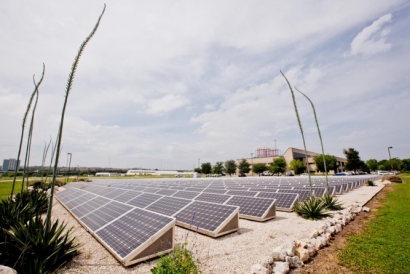
Most current solar energy systems utilize storage outside of the generators that create the power. In other words, two separate systems are required to ensure successful operation.
But experts from UT’s Cockrell School of Engineering have developed a way to integrate solar power generation and storage into one single system, effectively reducing the cost by an estimated 50 percent. The UT project will develop the next generation of utility-scale photovoltaic inverters, also referred to as modular, multifunction, multiport and medium-voltage utility-scale silicon carbide solar inverters.
Collectively, the combined technologies are known as an M4 Inverter – their main function being the conversion of the direct current output of solar panels to medium-voltage alternating current, which eliminates the need for a bulky and expensive low-frequency transformer.
Electrical and computer engineering professor Alex Huang, who directs the Semiconductor Power Electronics Center in the Cockrell School and works with the UT Center for Electromechanics, is the lead principal investigator for this DOE-funded project. He believes the M4 Inverter will create efficiencies in a variety of ways.
“Our solution to solar energy storage not only reduces capital costs, but it also reduces the operation cost through its multifunctional capabilities,” Huang said. “These functionalities will ensure the power grids of tomorrow can host a higher percentage of solar energy. By greatly reducing the impact of the intermittence of solar energy on the grid and providing grid-governing support, the M4 Inverter provides the same resilience as any fossil-fuel-powered grid.”
One such additional functionality is the ability to provide fast frequency control, which would prevent a solar-powered grid from experiencing blackouts on days when large cloud cover might obstruct solar farming.
To achieve the level of efficiency needed to convert the solar energy to the power grid, new silicon carbide power electronics switches will be used in the M4 Inverter. The need for a 60-hertz transformer is eliminated to further increase the efficiency and to reduce the capital and installation cost. Construction of the system will be based on the modular building block concept, reducing manufacturing costs and providing reliable operation through a power backup. The team will partner with the Electric Reliability Council of Texas, Toshiba International, Wolfspeed and Opal-RT, as well as Argonne National Lab.
The DOE awarded $20 million in funding for nine projects to advance early-stage solar power electronics technologies. The projects chosen were deemed critical to addressing solar photovoltaic reliability challenges, lowering the cost of installing and maintaining a photovoltaic solar energy system and achieving the DOE’s goal to cut in half the cost of electricity for a solar system by 2030.

